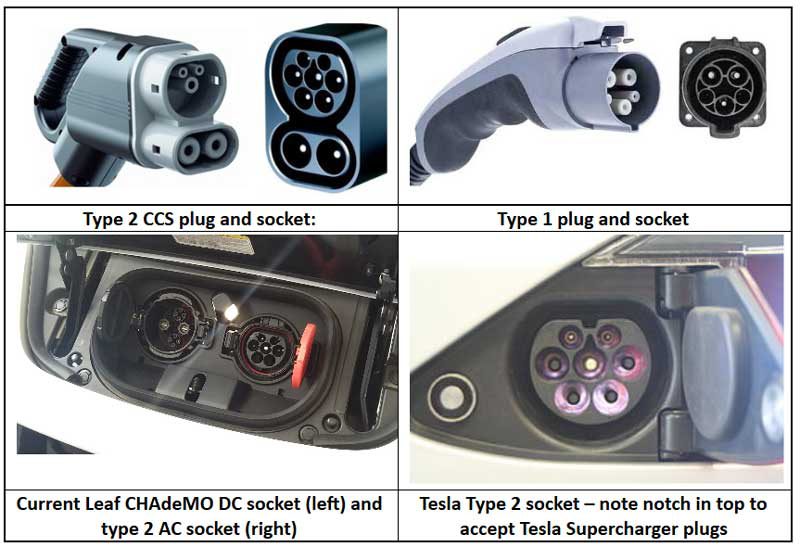
Can non-Tesla electric cars use Tesla EV chargers?
We are encouraging questions from readers about electric vehicles, and charging, and whatever else you want to learn. So please send them through and we will get our experts to respond, and invite other people to contribute through the comments section.
Can the Tesla charge stations be used by other EV’s such as the Kona Ioniq or Leaf 3? Is there a charge if these vehicles are able to access the Tesla supercharges?
Robert
Ah Robert – you’ve asked the $64 question …
The short answer is that some Tesla chargers (better referred to as EVSEs, or Electric Vehicle Supply Equipment) will charge some non-Tesla Electric Vehicles (EVs).
The tricky parts are:
- knowing which EVSEs and which non-Tesla EVs and
- keeping up with the changes!
The reasons behind this are a mix of:
- It is taking a while for the world to settle on common plug and charging standards;
- Tesla needs charging solutions ahead of the rest of the world, and;
- Bloody minded existing auto manufacturers that not only wouldn’t take up the early Tesla offer to share chargers and plugs, so instead the rest of the EV manufacturers took ages to agree between them about plug and charging standards!
So where do we start? To begin with, all new EVs in Australia (including Tesla) now use the same standard AC socket – this being Type 2. This however has not always been the case.
AC chargers
Until a couple of years ago, Type 1 plugs predominated – but the Type 2 standard has taken over as it has many advantages in 230/400V three phase electric supply countries.
On the other hand, Tesla outside the USA and Japan used the Type 2 socket well before the rest of the world – hence all Tesla Models S and X here are fitted with the Type 2 socket and in fact can charge at any Type 2 EVSE, not just Tesla ones.
Conversely, older EVs cannot charge directly using a Tesla AC EVSE as their plug is different. (They can with the use of an adaptor – with the caveat below).
Tesla AC EVSEs (be they home or ‘destination’ ones) are therefore all Type 2 plugs, so in theory can charge any Type 2 socket fitted EV (or a Type 1 with a Type 1 to 2 adaptor).
However, Tesla AC EVSEs may be set to charge ‘only Teslas’, or to a ‘legacy’ mode where they will charge (most) EVs from other manufacturers.
(The ‘most’ is because, as mentioned at the start of this article, it took a while for the charge plug standards to settle, so some older EVs are not fully compliant with the current Type 2 plug communications standard).
Commonly, where there are two Tesla ‘destination’ AC EVSEs on site, Tesla sets one of them to charge non-Teslas and one to ‘Tesla only’. Where there is only one, it can be hit-or-miss as to which setting was chosen.
For home EVSEs, they should be set to ‘legacy’ so as to be able to charge any EV that comes along – but not all installers are familiar with the setting process.
DC chargers
Tesla ‘Superchargers’ on the other hand are a fast-charge DC EVSE system.
Whilst they seemingly are fitted with the same Type 2 plug – these cannot be inserted into other manufacturers EVs, even if they are fitted with Type 2 sockets. (In fact the Tesla Supercharger plug has an innocuous looking additional tag in the plug that prevents it being inserted into a normal Type 2 socket).
Instead, the rest of the world’s EV manufacturers use a different (higher capacity) DC charging plug to suit the Combined Charging System (CCS).
As a consequence, Tesla Superchargers cannot currently charge a non-Tesla.

However, this is all about to change! Tesla are now fitting the CCS socket to the Model 3 in Europe (and will also do so in Australia when they arrive).
As a result, Tesla Superchargers here will soon start to sport CCS charging leads alongside the older Tesla DC charging lead. This means the Kona electric (and almost all other new EVs) could soon theoretically charge at any AC or DC Tesla EVSE*.
The outcome of all this is Tesla EVSEs will soon be compatible with (and have the same charging plug as) almost all other EVs. The question therefore becomes ‘will Tesla open up their charging network for use by others?’
To sum up:
- You can use a Tesla AC EVSE with other EVs, depending on the EVSE settings (plus the use of an adaptor for Type 1 socket fitted EVs) as most AC Tesla EVSEs are home or business based and have no system for payments built into them;
- You can’t use a current Tesla Supercharger with any other EV as the plugs are incompatible;
- You could use the soon to come upgraded Tesla Supercharger network using CCS2 with any new EV (except for the Leaf) if Tesla opens up their network (and comes up with a pricing system) to enable it to be used by others.
Bryce
*Note: The one exception to this is the new Leaf. The Leaf here will be fitted with a type 2 AC socket – but for DC charging Nissan are sticking to their proprietary CHAdeMO DC charging system. This means the new Leaf will effectively be locked out of the new fast-charge DC charging systems being rolled out, as these will mostly have CCS DC plugs.
Source: thedriven.io
















